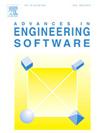Time-variant reliability analysis using phase-type distribution-based methods
IF 4
2区 工程技术
Q2 COMPUTER SCIENCE, INTERDISCIPLINARY APPLICATIONS
引用次数: 0
Abstract
The performance of engineering structures often varies over time due to the randomness and time variability of material properties, environmental conditions and load effects. This paper proposes phase-type (PH) distribution-based methods for efficient time-variant reliability analysis. The core of the proposed methods is to approximate the extreme value of a stochastic process as a PH distributed random variable, and treat the time parameter as a uniformly distributed variable. Consequently, the time-variant reliability problem is transformed into a time-invariant one. Three representative time-invariant reliability methods, first-order reliability method (FORM), importance sampling (IS) and adaptive Kriging (AK) surrogate model-based IS method (AK-IS), are integrated with the PH distribution-based approximation strategy to form the proposed methods, namely PH-FORM, PH-IS and PH-AKIS. The efficiency and accuracy of these methods are demonstrated through three examples. All codes in the study are implemented in MATLAB and provided as supplementary materials.
利用基于相位分布的方法进行时变可靠性分析
由于材料特性、环境条件和荷载效应的随机性和时变性,工程结构的性能往往随时间而变化。本文提出了基于相位型(PH)分布的高效时变可靠性分析方法。所提方法的核心是将随机过程的极值近似为 PH 分布随机变量,并将时间参数视为均匀分布变量。因此,时变可靠性问题被转化为时不变可靠性问题。将三种具有代表性的时变可靠性方法,即一阶可靠性方法(FORM)、重要度抽样(IS)和基于自适应克里金(AK)代理模型的 IS 方法(AK-IS),与基于 PH 分布的近似策略相结合,形成了所提出的方法,即 PH-FORM、PH-IS 和 PH-AKIS。通过三个实例展示了这些方法的效率和准确性。研究中的所有代码均在 MATLAB 中实现,并作为补充材料提供。
本文章由计算机程序翻译,如有差异,请以英文原文为准。
求助全文
约1分钟内获得全文
求助全文
来源期刊

Advances in Engineering Software
工程技术-计算机:跨学科应用
CiteScore
7.70
自引率
4.20%
发文量
169
审稿时长
37 days
期刊介绍:
The objective of this journal is to communicate recent and projected advances in computer-based engineering techniques. The fields covered include mechanical, aerospace, civil and environmental engineering, with an emphasis on research and development leading to practical problem-solving.
The scope of the journal includes:
• Innovative computational strategies and numerical algorithms for large-scale engineering problems
• Analysis and simulation techniques and systems
• Model and mesh generation
• Control of the accuracy, stability and efficiency of computational process
• Exploitation of new computing environments (eg distributed hetergeneous and collaborative computing)
• Advanced visualization techniques, virtual environments and prototyping
• Applications of AI, knowledge-based systems, computational intelligence, including fuzzy logic, neural networks and evolutionary computations
• Application of object-oriented technology to engineering problems
• Intelligent human computer interfaces
• Design automation, multidisciplinary design and optimization
• CAD, CAE and integrated process and product development systems
• Quality and reliability.
 求助内容:
求助内容: 应助结果提醒方式:
应助结果提醒方式:


